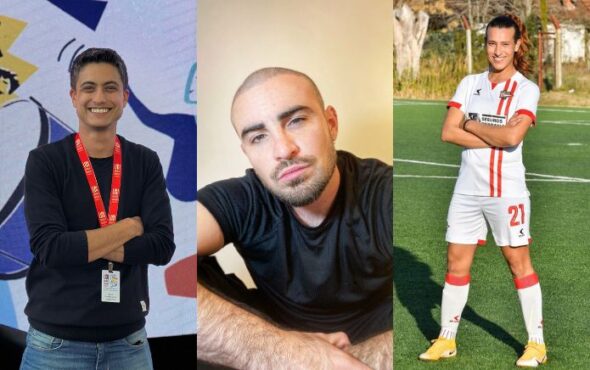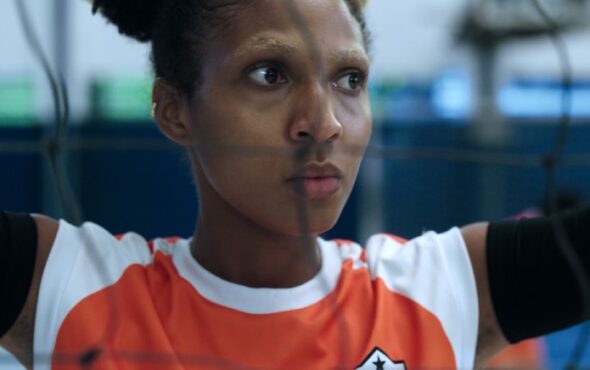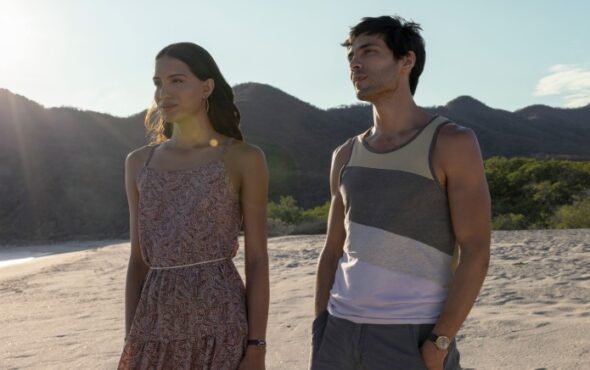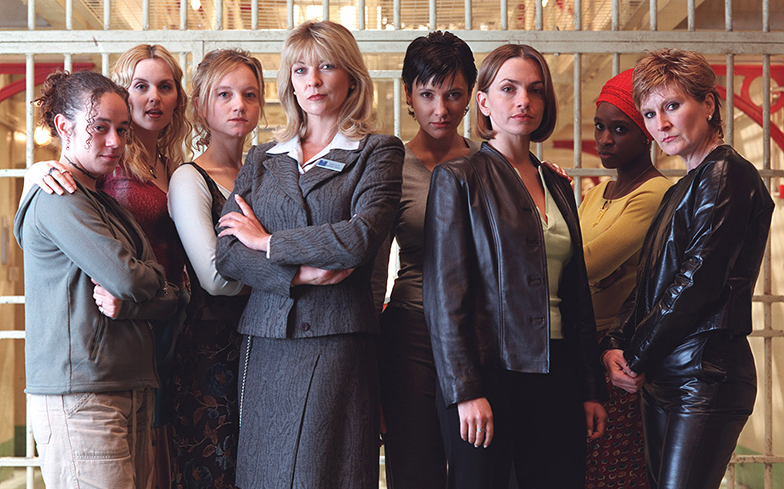
ITV prison drama Bad Girls changed the landscape for queer representation on screen – fact.
From putting same-sex female relationships at its heart to introducing transgender storylines, tackling racism and addressing addiction and abuse, there wasn’t a topic the game-changing show didn’t touch. And it’s this level of authenticity and braveness that won it a legion of fans back then, and even still today in this anniversary year.
20 years since the first episode aired in 1999, we revisit the baddest and the best ITV series to ever light up our screens with its original stars; Debra Stephenson (Shell Dockley), Claire King (Karen Betts), Simone Lahbib (Helen Stewart), Sharon Duncan-Brewster (Crystal Gordon), Alicya Eyo (Denny Blood) and Nicole Faraday (Snowball Merriman).
Taking a trip down memory lane, the cast discuss life on the inside of Larkhall Prison, if we could see a remake of the show, and why Bad Girls really did change the landscape for queer people on television.
Can you believe it’s been 20 years since Bad Girls first aired?
Claire King:
Erm… NO! I can’t but then I can’t believe it’s 30 years since I joined Emmerdale. Time just flies and… ok I left before the end of it, but it doesn’t seem that long ago.
Alicya Eyo:
I really can’t as it was such a massive part of my life, and met so many people who are still part of my life. The fact it is still around is really overwhelming – it’s amazing. It’s not going away!
Simone Lahbib:
Time goes by so quickly. It sounds like such a huge number. The other thing that keeps bowling us over is that it has such a strong following and picked up a few new ones.
Sharon Duncan-Brewster:
I loved it, it was a great experience for me to do and it really did change my life. I made lots of good friends. Bad Girls was a chance for me to work out how to develop a character as before that, I’d only done one-off episodes on TV. I started in 1999 and left in 2002 and that was enough of a chance to learn how to show nuance and deal with the storylines they gave us. We never knew what was going to happen. It was always exciting to go to work.
Debra Stephenson:
I was pregnant in real life with my son so because that was my pregnancy in real life, I’m always reminded that was quite so long ago!
Do you like talking about the show? Does it bring back fond memories?
Claire King:
Oh it does, yes. You’d expect with 40 women that there would be catfights but it wasn’t actually, everyone got on really well, I hate to tell you. It was one of those that you had to get your head down, and if there were any divas, they soon got slapped down. I remember we used to go in there about April/May for filming and then we’d come out in about September or October or the following year in March or something, eight months filming having never seen daylight. We started off all fresh faced and bronzed from being away, and then you’d come out all grey and miserable. (Laughs)
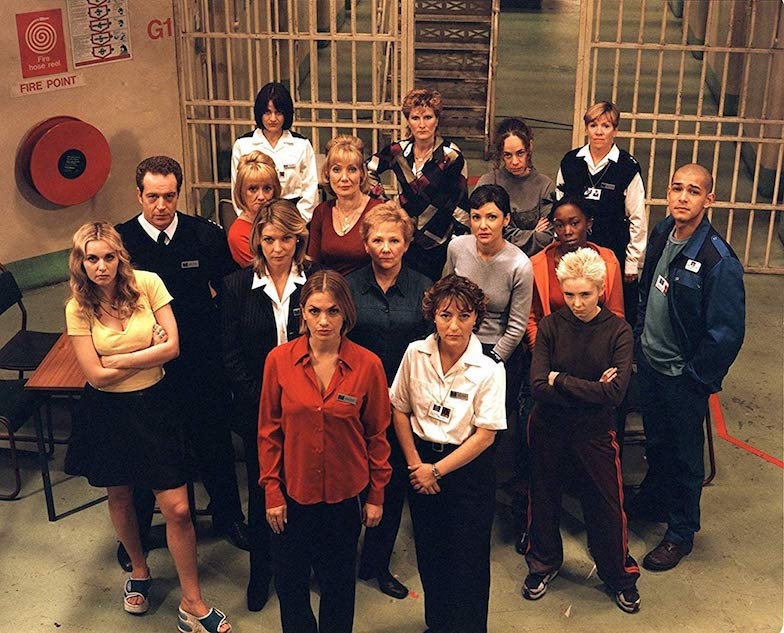
Shell Dockley is arguably the greatest character to come out of Bad Girls. What was it like playing her and tackling scenes like her giving birth?
Debra Stephenson:
That was the thing, it was an incredibly traumatic scene to film. It was only the last few years, literally years, that I’ve been able to talk about it without nearly crying. It was such a weirdly traumatic scene. Obviously I’m aware that it wasn’t real and I’m aware between myself and Shell Dockley, but because I was so hormonal and actually pregnant, I had to film the scene of the birth three weeks before I actually gave birth. When they took the baby away, it felt very real to me, even though it obviously wasn’t. It was just an awful thing to imagine that this was happening to somebody and I put myself in their shoes. A few years after that, it was just after Coronation Street, I did a documentary in California in a jail. I met a woman who it had happened to in hospital, and that was weird. That, I would say, would be my most harrowing scene to do. I wouldn’t say it was my favourite scene, but it was the one where I did my best acting because it felt very real.
What was the first seasons like for you as Helen Stewart? When did you know you were working on a hit?
Simone Lahbib:
We didn’t really know what we were working on. You get scripts, you read them and you know what’s one the page isn’t what is going to be on TV or screen because everything can change with editing. We didn’t really know until the first screening and so I remember at the end of watching episode one there was a group of us with this excited energy and everybody saying, ‘It’s good, isn’t it?’ I think we were all a mixture of relieved and excited to be a part of something like this. The show came out and it was constant surprises along the way. We didn’t expect it to continue to have a big reaction this far down the line. I speak to some of the fans on Twitter and I have to say that they’re constantly amazing. They’re just the best fans ever!
Sharon, how would you describe your time playing Crystal Gordon?
Sharon Duncan-Brewster:
Initially, Crystal was this very religious person, but when she started to become forthright about her relationships with Zandra and Josh, this allowed me to get stuck-in and explore the complexities of her personality. Something us actors love to do. It was always a giggle considering we spent all day inside for months and never saw a drop of sunlight. You’d get picked up at 6am, it was dark, you’d leave at 7pm, it was dark but we still had such a great time and that’s another thing that I will happily take from the show; how much we laughed and made lots of strong friendships.
Did you find that a lot of the characters had a hard exterior, but had good intentions?
Claire King:
Yeah and a lot of people would say that I play bitches. Well Karen wasn’t, she was firm but fair and I’ve always said that because she was good at her job, was fair, cut a bit of slack. At the end of the day, running a prison and it was the other people who were out to get her – Fenner!
Alicia Eyo:
With a character like Denny, especially being in prison, there’s a massive survival instinct. She missed out on loads with her parents and people took notice of her. When Denise Black came in, we got to explore that mother and daughter relationship. She was close with Linda Henry on the show who played Yvonne. I think it was an important story because she was vicious. The impact of her story and what she has to tell is that she was just a vulnerable child. It was great to get my head into and explore.

Snowball Merriman was the most controversial characters in all the Bad Girls seasons. Would you agree?
Nicole Faraday:
Yes, I think so. I got my big EastEnders moment by blowing up the prison at the end of series four which was one of the most memorable events that happened. I guess because she was brought in to cause all this trouble, she killed of Shaz who was with Denny. Blowing up the whole prison had an impact on all of the characters, not just my own. It was an amazing role to play, I used to pinch myself.
But alongside the fun and silliness of the show, Bad Girls also touched on some important and serious storylines. Claire, the Tessa Spall storyline is one of the hardest on the show, something you were directly involved in.
Claire King:
Yes, absolutely. It was quite scary in a way because people were still pretty ignorant in those days and it was the kind of start of highlighting HIV. It was very topical but people were very ignorant about it. It was quite scary in the way we had to run through the whole of the prison being held hostage by a needle. I can’t remember an awful lot about it… I’ve got to start watching them again now!
So What do you think made Bad Girls so groundbreaking?
Nicole Faraday:
It broke so many boundaries, taboo boundaries. It was the first prime time drama to have a lesbian relationship at its core. It was the first UK television drama that showed things from the view of the inmates, and was precursor to things like Orange is the New Black. We won lots of awards and were regularly hitting between 10-14 million viewers a week on a Thursday night.
Claire King:
I think because we’d all seen Within These Walls and then Prisoner Cell Block H which had the same kind of following – I used to love that – and off the back of that, nothing had been done for quite a long time about prisons, and all women made it so different from all the other stuff that was going on at the time. It stood out and the storylines were quite fast-paced, humorous with the two Julie’s, and then you had your poignant storylines. It was such a good balance that was set within a prison.
Did you know how revolutionary discussing female sexuality on national television would be?
Alicya Eyo:
I didn’t even think about that at the time, and in my mind and my own sexuality, it was a normal thing to do. I didn’t realise just how much it pushed the boundaries that it did until I’d left, actually. I’m super, super proud of the fact it was done in the way it was. I didn’t realise it at the time, I was caught up in telling these stories.
Was there ever a backlash or objections to the show? Did you ever see any negativity?
Debra Stephenson:
I don’t think it was everyone’s cup of tea, I think it’s fair to say. We never won any BAFTAs or anything and I think that there was a bit of snobbery. It wasn’t seen as high-end which is fair enough, but that’s probably the only thing. I never got any negative feedback as such. It was popular and I think what’s surprising that, not so much it was 20 years ago, but the fact it’s still popular after 20 years and achieved a cult status.

Simone, did you have any idea back then how important Helen and Nikki’s relationship would be for queer people?
Simone Lahbib:
No. The honest answer is no, and I don’t think we really fully understand until the Bad Girls convention we did a couple of years ago. It was the first time having that meeting with fans and they really wanted to tell their story and the impact. Now I understand. Now I get why this has continued to have a following. There were lots of letters that came in towards the end. We’d finished filming long before and they came in towards the end of the first season. I had more letters than I was able to read. The ones I did read were an outpouring of people saying the impact the show and storyline had. Not just this but lots of storylines as well. I’d never experienced that, nor since. It really was something special.
20 years ago, did the progression feel important at the time of filming?
Sharon Duncan-Brewster:
Looking back, I’m very proud to say that I was in Bad Girls. For example, Crystal was a Black woman, she was religious and they did address her culture, her faith and her race in various storylines. But also many other aspects to her character. She didn’t get killed off in the first episode, you know what I mean?! She actually stayed for four seasons. That was almost a miracle back then, no joke! Our characters had more than one dimension and believe it or not that was also quite rare at the time Bad Girls came out, addressing many different parts to each person. I didn’t realise at the time what a profound piece of programming it was and I’m glad that the team did dig their heels in and push to make this drama happen.
Alicya, a big part of Denny’s storyline was around sexual abuse. Did it ever create a dialogue with you and fans, and their experiences?
Alicya Eyo:
Yes, very much so. I had a lot of letters from people who really related to her on that front. Back in the day, I would write back to everyone who sent me letters, and people who I’d meet on the street who would want to talk about it. I always had time because you don’t realise the impact. For you, it’s a job, but they can identify with certain bits of her trauma growing up. That was massive and took me a while to have those conversations.
Just before Snowball took her life in that infamous scene in the main prison, she decided to face the mob of inmates. Nicole, what was it like being at the centre of the show and having everyone watching?
Nicole Faraday:
It was a bit of a baptism of fire Bad Girls because she instantly was up to all this trouble. My first ever scene I had to film, they had me at the end of season four in the chapel with the lighters. I’d never even met the rest of the cast and I came into this award-winning drama to film this scene, I was meant to sing this hymn but I was so frozen with fear. This was the first time meeting many of the girls and they were watching me do the speech which was really, really scary. They changed it so everyone sing it with me on my first day. The scene you referenced, I felt we were all friends and I didn’t see it as intimidating then.
How did you feel when the writers told you she would die?
Nicole Faraday:
I was gutted when they told me she was taking her own life. It’s such a shame because she’s so clever and turned into this sobbing mush because she can’t handle life without her boyfriend. For me as an actress, it was the best job I’ve ever had and to be told that you’re hanging yourself, I thought it was a joke at first.

I think the show also highlighted the fact that people aren’t perfect, some of us make bigger mistakes than others. That these are still people inside often tough exteriors.
Alicya Eyo:
Absolutely! Absolutely, yeah. They’re all human, they all have their story. This was great because we all got to look at these stories in great detail as the series went on. I think, especially for women in prison at the time, you were looked down upon because women shouldn’t be inside. We shouldn’t be committing crimes. They are human, they’re people and they’ve got rights. I think that was an important thing for us to get across and that came because you had to care about the characters, and I do think people did. The writers and creators did that perfectly.
Do you have all have a favourite moment from the series?
Claire King:
I think it was actually the general love of all the girls as we were quite a close set. We had to work eight months of the year in this massive aircraft hanger basically at 3 Mills Studios in London. Every Friday we’d cross the bridge to Tesco and get a picnic and come back to the studio and have a Friday afternoon… while still filming, but heath and safety didn’t come into it quite as much.
Sharon Duncan-Brewster:
When I think back, I always loved the relationship between Zandra and Crystal when she got sick. Crystal was in there for what we’d say is petty crime, she was a shoplifter, and for her, such a pious person to spit in that doctors face and deliberately get her sentence extended to stay and look after her friend, showed how special Sandra was to her. Prior to that, Crystal was always casting judgement on the other inmates. I think this finally allowed the audience to see her in a new light. She was one of the gang. Another plot-line I loved was her and Josh; the baby, getting married, sneaking around and seeing that calmer side. She was someone who had her vulnerabilities just the same as the others inside Larkhall.
Simone Lahbib:
Erm… several. I think the happy ending storyline between them (Nikki and Helen) stands out. There was a point of consideration about going back in and doing the third series. I felt very strongly that it was important to finish that storyline. The writers had suggested they would get their happy ending so that brought me back. I wanted the fans to have that experience and it finished off them on a high.
So what did Karen really think of Jim Fenner in the end?
Claire King:
I think at the end she saw him for his true colours. He certainly tried to put her away… but she got her own back in the end! I think she saw him for the nasty piece of work that he was.
How did they not realise what he was doing?!
Claire King:
I know, I know! Stupid woman. I know.

Debra, do you have a favourite line from Shell Dockley?
Debra Stephenson:
Erm… well I mean the naughtiest ones come to mind. There’s quite a lot! The one I had to audition with was where she gets Joanne Froggatt’s character against a wall and says ‘I’ll cut your tits off’. I had to audition with that line with a casting director who was a very, very sweet lady, very petite and mature. So lovely, so lovely. I wanted the job but they wanted to see me be nasty and told me to do it to this lady. I got her and pushed her against the wall, and I felt mortified afterwards. I did get the job so it was what they were looking for.
Looking at what fans say online even now, what they want to know is about the secrets on set. So what secrets can you tell me as this was a huge set, right?
Debra Stephenson:
We filmed the external shots at Oxford Prison, it was derelict at the time. Those days were freezing as we always filmed in winter. It was so spooky inside and, for me. The inside and most of the series was filmed on a set that was, at the time, the biggest free-standing set in Europe. That was placed at Three Mills Studios in East London. It was enormous and wasn’t very glamorous for us to film there. It wasn’t a high budget thing and had these little cabins to get changed in with gas heaters. I remember it being very cold. Those days were so long that it felt like you were in that whole world while there. There was one time I had to have no makeup on and jogging bottoms on. When we needed to have a rest, I was lucky as I had my own cell so I used to nap in Shell’s cell. Honestly that was luxurious compared to others as I had a proper bed. It might surprise people that it really wasn’t that glamorous to make. It was useful as it did keep us all immersed in the world and energy of the show.
Nicole Faraday:
They all used to go up to the derelict real prison, but by the time I’d joined, I think it had been sold or at least the plans were to sell it so the producers decided it was most cost effective to have our own exterior set. So what they did is to make moulds of the prison, measured it and we had exterior shots in a field in East London. They recreated the walls from the prison and had walls with nothing behind. If you watch the first three series, every time they did outside shots, those are the actual old prison.
I heard that the location for the outside of the prison is now a hotel?
Claire King:
Yes it is. There would be dead pigeons, now that’s one of the big hotels. I actually visited it and they are all the prison cells but double doors and two doors now make one room rather than one cell, but it is pretty impressive. It’s worth a trip as we did an awful lot there for many years. There was a small set built on the back but we had a good run of about six years.

Nicole, what was it like swapping characters and playing Shell Dockley in Bad Girls: The Musical?
Nicole Faraday:
They called me in within a month after I’d finished filming and I thought I was coming back in some way. They came up with the musical and asked me to play her. Shell came back and the character set my head on fire for Snowball nicking her look, so it was a full circle to then be asked to play her in the musical which is based on series 1-3 so Snowball isn’t in it. I won awards and got to star in an original West End musical and do an original cast album. Not only was it my telly job but the best ever theatre job I’d ever done. I owe my career to Bad Girls on both stage and screen.
The musical shouldn’t work… but it does! Serious, but camp.
Nicole Faraday:
I think so. And the good thing is that it stands alone as a piece of drama for those who had never seen the television series, and loved that the central story was this lesbian couple. You’ve got fans of Bad Girls that then went back to watch the TV series, so they co-exist. I got to do the show from a different angle. You don’t really ever get to play two characters from the same television show. Even though we didn’t run as long as we’d like to have done, it lives on and has this incredible cult following because we made a DVD of it. I’m very proud to have been in all versions of Bad Girls.
Who do you see yourself more as?
Nicole Faraday: I think I see myself more as Snowball… well, no. Equally as Shell and Snowball. Although Debra Stephenson was so amazing in the TV series. I like playing them both for equally different reasons.
Alicya, when Denny is transferred to an open prison and departed the show, what was it like leaving?
Alicya Eyo:
It was one of the hardest decisions I had to make, but it was the right time. I remember my last day as there weren’t many cast members around but it was the last day of filming for that series, with the wrap party that evening. It felt really surreal. It was the end of an era for me. Again, I didn’t realise what that meant until I left. I grew up on that show and went through a lot professionally and personally. I’d made these friends. I was sore for a little while and couldn’t watch the show for a little bit afterwards.

And finally the most important question… would you all be up for a Bad Girls remake?
Debra Stephenson:
Yes, 100%. I would. I never say that about other jobs that I’ve done. I think there’s still some magic about it that you could explore and come back to and move on with. You’d love to know what’s happened with all those characters in 20 years. When we had the convention, it wasn’t a full cast but it was really great to see everyone and made us think that we’d all do it again. I don’t think there’s anybody who wouldn’t. I think it would be popular!
Alicya Eyo:
I never say never. My only concern would be that it would have to be a new show and new people. Recreating that character, I’d really have to think about that. I’m sure somebody would come up with some fantastic idea and if they came up with something spectacular, then of course. It would be an honour to reprise that in some form.
Simone Lahbib:
Yeah, I would. I would. You’d just have to hope the writers would know it’s much later in their lives and they’d bring that into the storylines. I think it could be really interesting. I’m really keen to see more mature actresses and those for older women being explored, so this might be the perfect thing to do that. Absolutely, I’d be well up for it.
Sharon Duncan-Brewster:
We were talking about this last year. 20 years, I can’t even believe it. I was asking some of the gang if they’d do it again and, as far as I know, most of us said we would, depending on what the storyline was and who the writers were. You can’t come back and be any old fluff, it has to be of now, current, but there still needs to be some Bad Girls nostalgia there but as time has flown we’d need to address what has and hasn’t changed in the prison system politically. We need to talk about these ongoing issues and the people affected by it. I always sit and wonder what the two Julie’s would be doing now? Did Helen and Nikki stay together? What happened to my kid, and Zandra’s baby? Who is still inside? So many questions. If we had the right team, I’d happily be involved. We’ve all move on in our careers and it would be lovely to get back together and do it. But, of course, it depends on the script. So to a possible three-parter, with a great script and cast, schedule permitting, I’d probably say yes for the fans.
Nicole Faraday:
Oh my God, yes. Except who would I play because she’s dead? Unless I play her sister? You didn’t really get much about her backstory and could come back as a sister you never knew she had. But sadly I am dead. Snowball is dead. Maybe I could come in as Shell’s cousin. I thought it was a fantastic show, I liked watching it even when I wasn’t in it. Yes. I’m forever grateful to Bad Girls because it’s been the largest part of my career to-date. I still get fan mail which is really nice. The Bad Girls fans are brilliant people and even though I play evil characters, they come support me with live theatre. It’s really lovely that people still enjoy the show, even though it’s 20 years ago, although I didn’t start then. It was 2001-2003 I was in it.
Claire King:
Erm… well… I guess it’s ITV so I’d have to speak to them. It would have to be another company that did it because the one then has closed down. I know a lot of people want it to happen. I think about if we did a reunion one that could be quite entertaining. So yeah, the cell door is locked but it’s not bolted if you know what I mean.
All eight series of Bad Girls are available on Amazon Prime now. Nicole appears in pantomime this December. More information can be found here.

